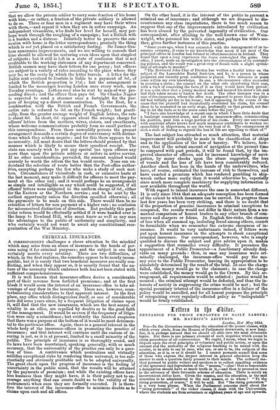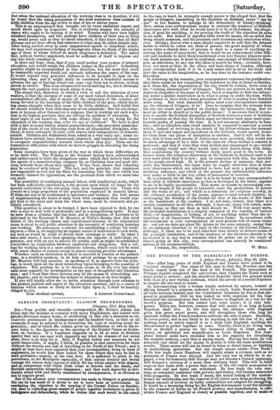Itttrro tu tr (Mita.
EDUCATION FOR THOSE EMPLOYED IN DAILY LABOUR: 3111. MA.URICE'S LECTURES.
_London, 31et .3fay 1854, Sin—In the discussions respecting the education of the poorer classes, with which every circle, from the Houses of Parliament downwards, is now faith- liar, it is perhaps natural that we should all slide into the most debateable topics. But there is one primary element of such inquiries which seemsle claim precedence of all controversies. We ought, I mean, when we begin to dispute upon the rival principles of voluntary and public action, or upon the amount and the authority of the religious teaching to be mixed with the secular, to be able to say at once, who are, or are to be, the subjects of the education, as it is, or as it should be. I cannot persuade myself thaA some of those who express the deepest interest in general education keep the answer to such a question fairly present to their minds. The ordinary me- thod pursued by public writers and speakers is to collect appalling evidence of the ignorance and degradation of the " masses,"—alas ! that so lamentable a designation should have so much truth in it,—and then to proceed at once to the advocacy of their favourite scheme of education. There is surely MI inconvenient salted; here.. Given .the ,masses, and the education, is the said education to be administered to the said masses; or. to whom ? To the rising generation, of course," it viill be said. But "the rising generation" is a very loose phrase. When the Parliament concerns itself about the "rising generation" of the richer classes, it deals with the Universities, where the students are from seventeen or eighteen years of age and upwards.
But when the national eduoation of the working class is in question, it will be found that the rising generation of the most numerous claw consists of little children from the age of five to that of ten or eleven years.
This is an unquestioned fact, brought out by every statistical report, and much dwelt upon by Inspectors. But it evidently escapes the memory of many who ought to be bearing it in mind. Persons who have been highly educated themselves, and who perhaps have children of their own to bring nN would never talk as they do about education' if they knew that all their phrases and all their efforts had reference to what may be called infants only. After being carried away by some impassioned speech or trenchant article, we may well experience a feeling of incongruity when we think of the tender age of those to whose behoof so much el.. uence is dedicated. The naked fact, without further argument, must be su cient of itself to impress any one who fairly considers it. Is there any hope, then, that if you could perfect your system of primary ' education, you would retain the children longer in the school ? Something possibly might be accomplished in this direction, but the most that could be reasonably expected would not seriously influence the aspect of the case. It would require very powerful influences to be brought to bear on the labouring clam, and it might fairly be considered a wonderful success to advance the age of leaving school one year—say from ten to eleven, or from eleven to twelve. This is an advance well worth striving for, but it obviously leaves the real question very much where it was.
The simple fact, therefore, to which I wish to call the attention of your readers, is that the energies of sonic of our most valued statesmen, of many accomplished officials, and of nearly all the clergymen of the country, are being devoted to the teaching of the little children of the poor, which teach- ing ceases abruptly when they cease to be little children. God forbid that we should withdraw from that class any of our solicitude! But let not clergy- men or laymen allow themselves to suppose, that in working out such a sys- tem to its highest precision they are solving the problem of education. We must begin to ask ourselves, with some shame, what are we doing for the education of the working class after the age of childhood? We have to deal with a fact in social history almost unprecedented,—the prevalent emancipa- tion of the youth of our labouring class from all educational discipline, com- bined, it must unhappily be said, with almost total independence of domestic control. Children are withdrawn from school at a very early age ; home in- fluences have already been disastrously impaired, and employers have ceased to recognize responsibilities towards those whom they pay. These are the tremendous difficulties with which we have to grapple in educating the rising ' generation.
Some examples have been given of the way in which these difficulties are , to be dealt with. The Wilsons at the Belmont factory have acknowledged and endeavoured to fulfil the obligations under which they believe that even the agents of a manufacturing company lie, as Christian men and good citi- zens, towards those whom they employ. It has been shown that schooling may be combined with labour. This fact, and the principle that employers are responsible to God and the State for something like the care which was formerly claimed for apprentices, are the positions from which we must take our start.
The possibility of combining manual labour with intellectual study, which I has been sufficiently established, is the ground upon which all hopes for the mental cultivation of the labouring class must necessarily rest. There will always be a large proportion of the population employed in manual labour. If these are not to be condemned to ignorance and vacancy, the best means of supplementing the hours of daily work with occupation that would sup- ply food to the mind and train the whole man, must be zealously and pa- i tiently considered.
This question is about to be treated, I have been rejoiced to find, by one I who is sure to deal with it profoundly and in a sympathizing spirit. It may ' be seen from a syllabus that has been put in circulation, of Lectures to be delivered by the Reverend F. D. Maurice, at Willis's Rooms, that this tried friend of the working classes and experienced labourer in the educational cause is about to call public attention to the necessity of combining learning ' and working. He announces a scheme for establishing a college for work- ingmen,—that is, for supplying an organic course of instruction to such work- ing men as would be ready to devote their evenings to study. In what I have said above, I have been speaking from the impulse of individual ex- perience, and with an eye to schools for youths, such as might be established every-where by cooperation between employers and clergymen. But a col- lege for working men is a more ambitious scheme, which could not be tried with much chance of success except in places enjoying peculiar advantages.
Whether such an institution is likely to succeed in London at the present Um, is a doubtful question, to be best solved perhaps by an experiment. Mr. Maurice will find occasion, in speaking of it, as appears from his aylla- , bp, to touch upon all the most interesting topics belonging to the question of education. The problem he is to discuss seems to be the very one which calls most urgently for investigation on the part of thoughtful and Christian men ; and I trust that these lectures may be the means of stimulating use- ful inquiry, and of elevating the subject of education to its true height. If you will kindly allow me to invite attention through your columns to the present position and aspect of the education question, and to a course of lectures which seems so likely to throw light upon it, I shall be heartily obliged to you.



































 Previous page
Previous page